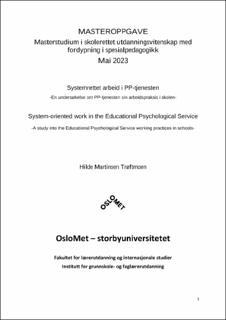Systemrettet arbeid i PP-tjenesten - En undersøkelse om PP-tjenesten sin arbeidspraksis i skolen
Master thesis
Published version
Permanent lenke
https://hdl.handle.net/11250/3088891Utgivelsesdato
2023Metadata
Vis full innførselSamlinger
Sammendrag
PP-tjenesten er en del av skolens pedagogiske og spesialpedagogiske støttesystem. Tjenestens mandat er todelt i henhold til opplæringsloven § 5-6. Den ene delen er systemrettet og innebærer arbeidet med kompetanseutvikling og organisasjonsutvikling, og den andre delen er individrettet og innebærer utarbeiding av sakkyndig vurdering der loven krever det. PPT sitt arbeid med forebygging og tidlig innsats i skolen er en del av det systemrettede arbeidet til PP-tjenesten, og er beskrevet som forventninger i kvalitetskriteriene til PP-tjenesten som er ment å stimulere til at PPT skal arbeide mer systemrettet. Hovedformålet mitt med mitt masterarbeid har vært knyttet til PP-tjenestens arbeid med forebyggende arbeid og tidlig innsats i skolen med følgende problemstilling: «Hvordan kan rådgivere i PP-tjenesten arbeide med forebyggende arbeid og tidlig innsats i skolen?» Jeg valgte å benytte mixed methodes research (MMR), «blandede metoder» som forskningstilnærming, der det samles inn og analyseres både kvantitative og kvalitative data innenfor samme studie (Shorten & Smith, 2017, s. 74). Jeg benyttet spørreskjema på nett, som bestod av både lukkede og åpne spørsmål der respondentene kunne utdype svarene sine og kommentere. Spørreskjemaet ble sent til PP-rådgivere ved ti ulike PP-kontorer. I analysen av datamaterialet brukte jeg frekvenstabeller som grunnlag for grafisk framstilling av de kvantitative dataene, samt pivottabeller i Excel for å sammenlikne variabler. For bearbeiding av de kvalitative dataene brukte jeg tematisk analyse. Jeg benyttet en hermeneutisk fortolkningsprosess i tolkningen av datamaterialet. Mine funn viser at det er 76,3% som jobber mest individrettet, og 18,4% som jobber mest systemrettet. Min undersøkelse kan dermed tyde på at denne praksisen ikke har endret seg noe særlig på ti år. PP-rådgiverne svarer at den største årsaken til at PP-tjenesten jobber mest individrettet, er stort antall individsaker som henvises PP-tjenesten og at det er et stort individfokus i skolen. I spørsmål knyttet til sakkyndig vurdering svarer de fleste at de henviser til diagnoser eller vanskeområder hos barnet når de argumenterer for spesialundervisning. De fleste respondentene svarer at PPT i stor grad bidrar til tidlig innsats i skolen, og har gode rutiner for å kunne delta i det forebyggende arbeidet. Faste kontaktmøter og faste kontaktpersoner på skolen oppgis spesielt som suksessfaktorer. Barrierer for å arbeide mer forebyggende i skolen peker i retning av mangel på ressurser i PPT, stort individfokus i skolene, at rutiner kan utarbeides tydeligere og bli mer strukturert. De fleste PP-rådgiverne oppgir at de ønsker å jobbe mer systemrettet mot skolene, og undersøkelsen min peker i retning av at det er positive holdninger til systemarbeid i PP-tjenesten. I siste del av oppgaven min har jeg skissert noen forslag til tiltak, der forebyggende arbeid og inkluderende praksis, laget rundt barna og elevene – rutiner og samarbeid er i fokus.
The Educational Psychological Service (EPS) is part of the school's educational and special educational support system. The service's mandate is twofold in accordance with § 5-6 of the Education Act. One part is system-oriented and involves work related to competence development and organizational development, and the other part is individual-oriented and involves the preparation of an expert assessment where the law requires it. The EPS’s work related to prevention and early intervention in schools, is part of the system-oriented work of the ESP, and is described as expectations in the quality criteria for the EPS, which are intended to stimulate the EPS to work more system-oriented. My main purpose with my master thesis, has been linked to the ESP’s work with prevention and early intervention in schools with the issue: "How can counselors in the ESP work with prevention and early intervention in schools?» I chose to use mixed methods research (MMR), as a research approach, where both quantitative and qualitative data are collected and analyzed within the same study (Shorten & Smith, 2017, p. 74). I used an online questionnaire, which consisted of both closed and open questions where the respondents could elaborate on their answers and comment. The questionnaire was sent to counselors at ten different offices in the ESP. In the analysis of the data material, I used frequency tables as a basis for graphical presentation of the quantitative data, as well as pivot tables in Excel to compare variables. For processing the qualitative data, I used thematic analysis. I used a hermeneutic interpretation process in the interpretation of the data material. My findings show that it is 76.3% who work mostly individual-oriented, and 18.4% who work most system-oriented. My research can thus indicate that this practice has not changed much in ten years. The counselors in the ESP reply that the main reason why the ESP works most individual-oriented, is because of the large number of individual cases that are registered to the ESP, and that there is a large individual focus in schools. In questions related to expert assessment, most respond that they refer to diagnoses or areas of difficulty in the child when they argue for special education. Most of the respondents answer that the ESP largely contributes to early intervention in school, and has good routines to be able to participate in the preventive work. Regular contact meetings and regular contact persons at the school are particularly cited as success factors. Barriers to working more preventively in schools point in the direction of a lack of resources in the ESP, a large individual focus in schools and that routines can be drawn up more clearly and become more structured. Most of the counselors in the ESP state that they want to work more system-oriented towards the schools, and my survey points in the direction of positive attitudes towards system work in the ESP. In the last part of my thesis, I have outlined some proposals for measures, where preventive work and inclusive practice, created around the children and pupils - routines and cooperation are in focus.
